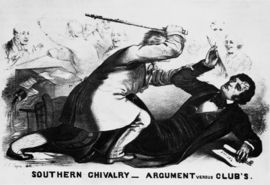I'm talking, of course, about Ira Einhorn. Einhorn was a well-known Philadelphia activist who murdered his girlfriend, Holly Maddux, and stuffed her body in a trunk. He turned up living in France, happily married and using another name, in 1997. (h/t to Atrios for the reminder)The French didn't want to extradite.
Of course, Einhorn's case is nothing like Polanski's, because every time a famous or important or brilliant man commits a crime against a woman (or in Polanski's case a girl) our public discourse treats it as an unique and exceptional case, which the usual laws don't adequately address. Then a public debate commences on whether the rules should apply to such a man at all.
And the next time a famous man commits a crime against a woman or a girl, that case will be entirely unique and special, too, in exactly the same way. Just like the unique and special man who committed it.
Others have written about this better than I can. Kate Harding has a compelling post at Salon dismantling Polanski's apologists, and Flavia at Ferule & Fescue has a great think piece about the larger women's issues. And I find myself thinking about a passage from Maureen Corrigan's book Leave Me Alone, I'm Reading, in which she recounts the kickoff party for her first year of graduate school, in 1977, at UPenn, at which a senior member of the faculty
knocks back another glass (what is this, his fourth?), stares over our heads at a spot on the wall, and mutters an oracular verdict: "None of you will ever come close to Ira Einhorn. He was the most brilliant student the department ever had."
The double lesson that Corrigan gleaned from this spontaneous tribute was that only brilliance mattered, and that only men qualified as brilliant. Anyone else just had to watch out for herself:
a woman could even be murdered and stuffed in a trunk, but if her boyfriend was "brilliant," he would the one who would be mourned for having his promising career ruined....
And that's what the Polanski case comes down to: what a man does to a defenseless child is turned into a debate about his personal wonderfulness. When we talk about Polanski, the victim is already at a disadvantage, cast in the shadow by the spotlight of his celebrity. Everything is about him.
But this is not about him. It never was. It is about what was done to her.
The argument that great artists or thinkers deserve forbearance for their crimes is always made in bad faith; those making it would never be willing to accept its consequences personally. No one goes around saying, "Martin Scorsese should be permitted to rape me, beat me, or kill me if he feels like it, because Raging Bull was such a cinematic landmark." When people say that different rules apply for artists, what they really mean is that their favorite artists should have permission to hurt and mistreat other people. They are saying, "There are lots of people I don't give a damn about, and Martin Scorsese's work has given me great pleasure, so he should be entitled to beat them, rape them, or kill them if he happens to be in that mood. And he should have gotten his Oscar much sooner." Of course, that principle is never phrased directly. How could it be?
The debate isn't about Polanski. It's about whether or not that thirteen-year-old girl matters. To Polanski's supporters, she clearly doesn't. They're okay with whatever happens to her. My question to them is: who is special enough not to get raped? If thirteen-year-olds without significant film credits are not allowed to refuse sex, or have even minimal control over what others do with their bodies, who is high enough on the A-list that Polanski can't violate her? Obviously, people would be upset if he sexually assaulted Julia Roberts or Meryl Streep, because they're so special themselves. If raping a child is okay and raping an Oscar-winner is not, where's the line? Is Whoopi Goldberg big enough that Polanski can't commit a felony against her? Is Debra Winger? What about development executives, or agents? Come on, Polanski fans, lay it out clearly. Girls need to be able to plan ahead.
